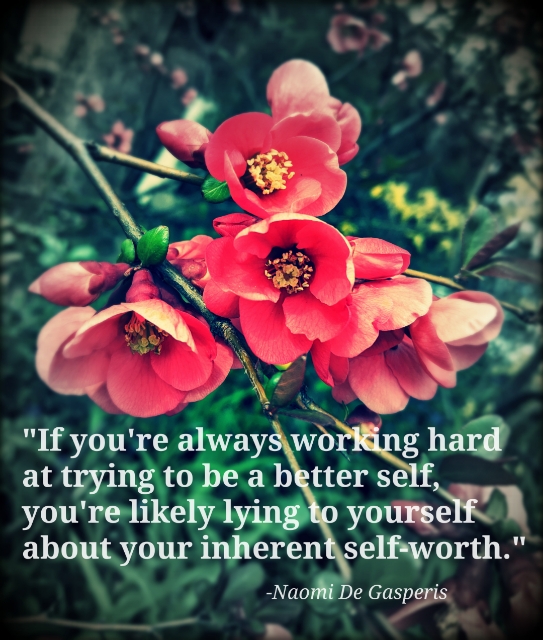When I was training at The Gestalt Institute of Toronto, my teacher Joanne had a saying:
“Trying is lying.”
It made no sense to me then, in fact I really didn’t like hearing it. I was constantly trying. I worked hard at everything because I had to get better. There was an exhausting, driving need to prove that I was intelligent, caring, kind, and lovable.
Though I wasn’t aware of what made me feel unworthy, I was definitely committed to changing this bad feeling with pure perseverance and effort. It was an unhelpful cycle of doing, learning, and becoming that left little room for being and experiencing. I thought that with time, I would heal and learn to be different and then, finally, I’d be happier and I could relax and enjoy my life.
This is a familiar cognitive distortion known as the “if…then” thinking that often sounds like, “If you get another degree, then you’ll be credible, if you lose those extra 10 pounds then you’ll feel confident, if you give more time then you’re a good friend, if you sacrifice more then you’re a good mother…” but the good feeling never lasts. Soon we’re back to feeling not okay and needing to figure out what is lacking so we can try harder. The trying itself is habit-forming because it works in giving us a false sense of control over the quality of happiness or unhappiness we’re experiencing at that moment. I believe this is in part what makes self-help books so popular and addictive.
What’s needed isn’t more time or effort. The more we try and change ourselves or others, the more this may be perceived as pressure. Feeling unacceptable evokes more resistance and can have the opposite effect. This way of being related to feels conditional. Change must be freely chosen, in awareness, for one’s own process of evolution. It requires unconditional neutrality toward the end result. This means that we must be willing to accept who we are, as are we, in order to feel safe enough to risk growth. We have to make sure that our efforts to change are not in fact reminders that we’re unacceptable, unlovable, and unworthy.
No one changes unless he or she wants to or sees a need for it. And more importantly, instead of pushing ourselves with the fuel of “not enoughness” we can begin to change with a growth mindset that is self-supportive.
It’s powerful to move from, “I’m not okay and/or you’re not okay. I/you need to change to be happy,” to “I’m okay, you’re okay. I choose to believe that we are inherently good people whose behaviours may be reflecting and perpetuating wounds. I am willing to see my part and allow you to awaken to yours on your own timing. I honour my experience and trust myself to keep evolving toward fulfillment as needed.”
Go ahead, reread that last part and see if and how it resonates differently.
Using the analogy of gardening, you are the gardener. You work the land, plant the seed, and provide the necessary conditions for light, water, and nutrients. Under your care, the seed will then grow to its full potential, whatever that may be. You can’t force a flower to be brighter, prettier, or more scented than what it is. Yet all flowers have beauty in their own process of blooming. Setting an intention for change without preconditions for acceptance and love is what makes the risk of changing feel less frightening.
If you’re always working hard at trying to be a better self, you’re likely lying to yourself about your inherent self-worth. Trust that every stage of growth is necessary and that even now, as imperfect as you may feel at times, you are deserving of experiences that reflect your innate goodness.


 Share on bsky
Share on bsky





Read 7 comments and reply